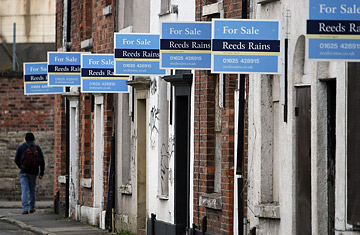
A row of for sale signs adorn the front of terraced houses in Macclesfield, England.
Exactly 12 months ago, as rival European banks scented the first whiff of danger in America's mortgage market, the Royal Bank of Scotland had other business in hand. As French, German and Dutch banks confessed to being hit by their exposure to soured U.S. sub-prime mortgages, an RBS-led consortium was closing in on its eventual $100 billion buy-out of Dutch rival ABN Amro, the banking industry's biggest ever takeover. One year on, and Britain's second-largest lender is still making news — though these days it's much less welcome. On August 8, RBS announced it had tumbled to a $1.33 billion loss in the first half of this year — a massive drop from the $9.6 billion profit it recorded in the first six months of 2007, and the bank's first ever loss as a publicly traded company. Behind the change of fortune: some $11.3 billion of its own write-downs on assets linked to the collapsed sub-prime market. RBS CEO Fred Goodwin said he was both "numbed ... and galvanized" by the loss. "It's my determination," he said, "to get us out of this place."
Right now, it's a familiar place to many of Britain's banks. On August 7, rival Barclays added $5.4 billion to the enormous sums British lenders have written off amid the credit crisis; London-based HSBC, Europe's largest bank, made a similar contribution a few days earlier. For banks across Europe, as for their U.S. counterparts, 2008 is proving painfully difficult. Globally, banks could write down as much as $450 billion more over the next three to four years, according to research from Deutsche Bank. Lenders, it says, are short of funds equivalent to 4% of their balance sheets, with those in Ireland, Spain and Britain finding fund-raising particularly tricky. As the U.S. sputtered over the past year, Europe's economies initially drew praise for motoring on. But housing markets in Ireland, Spain and the U.K. have turned down fast in the past few months and food and fuel bills have soared. Europe, it seems, has finally caught America's cold.
Take Britain. Just as it did in Ireland and Spain, consumer confidence in the U.K. swelled in recent years on the back of rising housing prices. But in all three countries, red-hot housing markets have suddenly gone cold. With jittery banks slashing the range of available mortgages, and rocketing gas prices nudging inflation to 3.8% — well above the Bank of England's 2% target — demand in Britain's housing market has been choked. House prices fell 1.7% last month, according to Halifax, a major mortgage lender, and a total of 8.8% over the past year. That's hit Britain's construction business hard. Shares in Taylor Wimpey, the U.K.'s largest house builder, have fallen more than 80% over the past 12 months. The construction downturn slowed growth in Britain to an anemic 0.2% in the second quarter of this year, the lowest quarter-on-quarter rate for three years.
In an attempt to shore up the housing market, British lenders have in recent weeks begun squeezing their fixed-rate mortgages to lure buyers in. The government, meanwhile, is examining a temporary suspension of the tax paid by new buyers. What's really needed, though, is an interest rate cut. That's unlikely. On August 7, the Bank of England opted to hold rates at 5% because it's scared a cut will allow inflation to balloon further.
Grappling with rising inflation at a time of weakening expansion is a challenge for the European Central Bank, too. Figures released on August 6, for instance, showed a shocking 2.9% fall in German manufacturing orders in June. The country, fuelled by a booming market for its exports, has lately helped drive growth in the 15 nations that use the euro. Rendered more costly by the recent strength of the currency, those exports are under pressure. The result: though inflation within the euro area stands at 4.1% — more than double the ECB's goal of 2% — the region's central bank announced earlier this month it, too, would keep rates on hold. "Both the ECB and Bank of England have been caught between a rock and a hard place," says Matthew Sharratt, an economist at Bank of America in London. "The best they can do is to leave rates where they are until they see some signs that inflation has peaked or started to come down."
